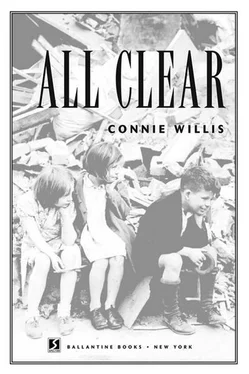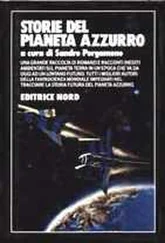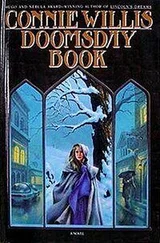Connie Willis - All Clear
Здесь есть возможность читать онлайн «Connie Willis - All Clear» весь текст электронной книги совершенно бесплатно (целиком полную версию без сокращений). В некоторых случаях можно слушать аудио, скачать через торрент в формате fb2 и присутствует краткое содержание. Жанр: Старинная литература, на английском языке. Описание произведения, (предисловие) а так же отзывы посетителей доступны на портале библиотеки ЛибКат.
- Название:All Clear
- Автор:
- Жанр:
- Год:неизвестен
- ISBN:нет данных
- Рейтинг книги:5 / 5. Голосов: 1
-
Избранное:Добавить в избранное
- Отзывы:
-
Ваша оценка:
- 100
- 1
- 2
- 3
- 4
- 5
All Clear: краткое содержание, описание и аннотация
Предлагаем к чтению аннотацию, описание, краткое содержание или предисловие (зависит от того, что написал сам автор книги «All Clear»). Если вы не нашли необходимую информацию о книге — напишите в комментариях, мы постараемся отыскать её.
All Clear — читать онлайн бесплатно полную книгу (весь текст) целиком
Ниже представлен текст книги, разбитый по страницам. Система сохранения места последней прочитанной страницы, позволяет с удобством читать онлайн бесплатно книгу «All Clear», без необходимости каждый раз заново искать на чём Вы остановились. Поставьте закладку, и сможете в любой момент перейти на страницу, на которой закончили чтение.
Интервал:
Закладка:
“No,” Eileen said. “I need to speak with Alf.”
“ ’E ain’t here,” Binnie said. “ ’E’s in school.”
“I know he’s here, Binnie—”
“Not Binnie. Dolores. Like Dolores del Rio. The film star,” she added unnecessarily.
“Dolores,” Eileen said through gritted teeth. “I know Alf is in there. I just heard his voice.” She tried to peer past Binnie into the room, but all she could see was a line of not-very-clean-looking washing.
“No, ’e ain’t. There ain’t nobody ’ere but Mum and me. And Mum’s asleep.” Her eyes narrowed. “What d’you want with Alf? ’E ain’t in trouble, is ’e?”
Very probably, Eileen thought. “No,” she said. “Do you remember that map Alf uses to do his planespotting?” She spoke loudly so Alf could hear her from inside the flat, and noticed Binnie didn’t shush her on behalf of her sleeping mother.
“Alf never stole it,” Binnie said, instantly defensive. “You give it ’im.”
“I know,” Eileen said. “I—”
“It’s ’is planespottin’ map,” Binnie said, and Eileen was surprised Alf didn’t pop up to chime in in his own defense. Was he hiding? Or had he gone out the window? She wouldn’t put either past him.
“Binnie—Dolores—no one’s accusing Alf of stealing it.”
“Then why’re you takin’ it back?”
“I’m not. I only want to borrow it, so I can look at something.”
“At what?” Binnie asked suspiciously. “You ain’t a Nazi spy, are you?”
“No. I need to look for the town where a friend of mine lives. I’ve forgotten the name.”
“Then ’ow can you look for it?”
Eileen knew from experience that this sort of back-and-forth could go on all day. “I’ll give you this if you’ll lend me the map,” she said, showing her the film-star magazine.
Binnie looked interested. “Is Dolores del Rio in it?”
Eileen had no idea. “Yes,” she lied, “and lots of other good names—Barbara and Claudette and—”
“I dunno,” Binnie said doubtfully. “Alf’d be awful mad if ’e found out. S’pose ’e needs to do some planespotting?”
“If you’ll let me in, I could look at the map here,” Eileen said, but that had the opposite effect from what she’d expected.
“I dunno where it is. I’ll wager Mum threw it out,” Binnie said, and tried to shut the door.
Eileen put her hand on it to stop her. “Then wake your mother and tell her I’m here,” she said, “and I’ll ask her,” and was surprised to see Binnie look frightened.
“I got to go now.” Binnie glanced behind her and tried to pull the door to.
“No, wait!” Eileen said. “Binnie, is anything wrong?”
“No. I got to go.”
“Wait, don’t you want your film magazine?” Eileen asked, and the sound of an air-raid siren starting up suddenly filled the corridor. “What—?” She looked frightenedly up at the ceiling. Polly’d said there hadn’t been any raids over the East End today. She’d said there hadn’t been any daytime raids at all. And it was only half past three.
“Binnie! Where’s the nearest shelter?” she cried, but Binnie had already drawn her head in and shut the door.
You have always told me it was Ernest. I have introduced you to everyone as Ernest … You are the most earnest-looking person I ever saw in my life. It is perfectly absurd your saying your name isn’t Ernest.
—OSCAR WILDE, THE IMPORTANCE
OF BEING EARNEST
Kent—April 1944
AT CESS’S QUESTION, MONCRIEFF SLOWED THE CAR, AND Prism twisted around to look at them. “Well, are you a spy?” Cess asked Ernest.
“Yes, Worthing,” Prism said, looking back at them from the front seat of the staff car. “Are you a German spy?”
“If I were,” Ernest said lightly, “I’d be working for our side, like all the other German spies.”
“All the spies we’ve caught,” Moncrieff said, without taking his eyes from the road. “Lady Bracknell evidently thinks there are some we haven’t caught, hence the memorandum.”
“So Bracknell thinks one of us is a spy?” Cess asked.
“No, of course not,” Prism said, “but this is a dangerous time. If the Germans were to find out that the First Army’s a hoax and we’re invading at Normandy instead of Calais—”
“Shh.” Cess put his finger to his lips. “For all we know, Moncrieff here is sending secret messages to the enemy. Or you are, Worthing. You’re always typing up letters to the editor. How do we know some of them don’t have secret codes in them?”
I have to get them off this subject, Ernest thought. “I think the bull’s your man,” he said. “He looked exactly like Heinrich Himmler. Is that Mofford House?”
“Where?” Cess said. “I can’t see anything.”
“There, beyond the trees,” Ernest said, pointing at nothing, and the three of them spent the next quarter of an hour attempting to catch sight of it, after which Cess spotted a turret and then the gates.
“I say,” Cess said as they drove in through them, “one can’t have a hospital without nurses. Have we got some?”
“Yes,” Moncrieff said. “Gwendolyn set it up.”
“Are they the same girls who helped us when we did the oil-refinery opening?” Cess asked. “The ones from ENSA?”
“No,” Moncrieff said. “These are the real thing. Gwendolyn borrowed them from the same hospital that lent us the beds.”
Ernest looked up alertly. “The hospital in Dover?”
“Yes, and don’t get any notions of flirting with them. There’ll be all sorts of higher-ups and Special Means people here. I don’t want any trouble.”
I don’t either, Ernest thought, and the moment they pulled up in front of the manor house, he snatched up his nightclothes and the boxes of bandages and took off for the house.
It was obvious why they’d chosen Mofford House. It had a moat and a distinctive turreted tower that the Germans would recognize, even though his newspaper story would say only, “One of England’s stately homes, whose name cannot be disclosed for security reasons, has been converted to a military hospital.”
He hobbled quickly across the drawbridge, hoping that since today this was supposed to be a hospital, he wouldn’t run into a butler at the door who’d demand to know where he was going.
He didn’t—only two soldiers attempting to wedge a hospital bed through the door. Beyond them he could see an entry hall and, off to the side, the room which was posing as the ward today. Inside it stood a cluster of older men in officers’ uniforms and several white-clad nurses.
He squeezed past the wedged bed, keeping out of their sight, down a corridor, and into the nearest unoccupied room, which turned out to be the dining room. He shut the door, wedged chairs against it, and, using the mirror above the sideboard, began winding bandages around his head.
He emerged ten minutes later in pajamas, robe, and slippers, his head and both hands swathed in bandages. “Where have you been?” Prism asked. “And what are you doing in that getup? You look like an escapee from an Egyptian tomb.”
Ernest pulled him off to the side. “You said they’d be taking photographs, and my picture was already in the newspapers from the opening of Camp Omaha. If the Germans see me in more than one photo, they’ll spot a fraud.”
“You’re right. Good show. Was Cess in the photo?”
“He wasn’t there. He was off doing dummy landing craft.”
“Good, then he can be the broken foot. Go help bring in the wheelchairs.”
Ernest did and then carried two oil paintings, three watercolors, and an antique writing table upstairs for Lady Mofford, made up the hospital beds, bandaged several other “patients,” and helped lay out tea in the library.
Читать дальшеИнтервал:
Закладка:
Похожие книги на «All Clear»
Представляем Вашему вниманию похожие книги на «All Clear» списком для выбора. Мы отобрали схожую по названию и смыслу литературу в надежде предоставить читателям больше вариантов отыскать новые, интересные, ещё непрочитанные произведения.
Обсуждение, отзывы о книге «All Clear» и просто собственные мнения читателей. Оставьте ваши комментарии, напишите, что Вы думаете о произведении, его смысле или главных героях. Укажите что конкретно понравилось, а что нет, и почему Вы так считаете.












